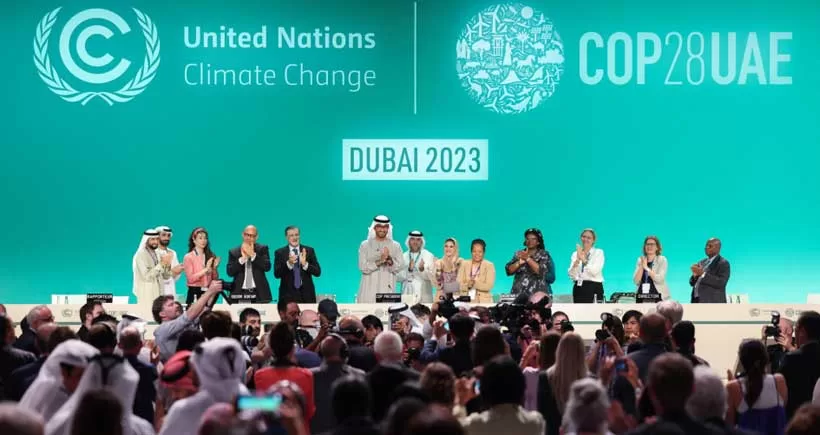While there is no simple fix to these issues, the UAE offers a masterclass in how an influential small state can manoeuvre adroitly through the chaos. Its approach to foreign diplomacy has placed the UAE in the valuable position of being able to speak to different sides on numerous issues. It offers an intriguing case-study of diplomatic practise at a time of global instability.
Size is a relative concept in international affairs. For a small country of just 9.3 million, the UAE’s wealth has propelled it to 31st in the world’s economies (ranked by nominal GDP). Clearly, some of the UAE’s influence flows from its wealth, but simply having resources is not the same as engaging in active statecraft and of choosing when to wield this influence.
This was clear amidst the tragedy of the war in Gaza that began on October 7. The UAE had signed the Abraham Accords with Israel three years prior, normalising diplomatic relations. As such, Abu Dhabi has had to walk a delicate tightrope, often finding itself at odds with its regional partners. Nonetheless, its ties with Washington and Jerusalem, combined with its voice in the Arab world, has placed it in a position to court major global players and to bring about positive dialogue.
This included leading international calls for providing aid to the embattled Palestinians in Gaza. On 22 December, the United Nations Security Council adopted Resolution 2720, proposed by the Emirates, which called for increasing the flow of life-saving humanitarian aid to the Palestinians in Gaza. It was approved by 13 of the UN Security Council’s 15 members, a mark of the UAE’s influence around this table as one of its non-permanent members.
Abu Dhabi held its Security Council seat between 2022 and 2023 and proved to be a voice not only for the Arab world, but for the Global South during major moments. Not only did it lead calls for a ceasefire in Gaza, but it also organised a visit for UN Envoys to Rafah ahead of the vote so that diplomats could see for themselves the devastation and continued humanitarian suffering.
On the ground in Gaza, the UAE has also leveraged its ties with the different sides in the war to open a field hospital in Gaza which was visited by CNN, and would not have been possible without its ties with Israel. Clearly, there will be no quick end to this bitter and tragic war. In the years to come, whenever the conflict finally subsides, the UAE has positioned itself to play a role in stabilising the situation by again talking to all sides.
The impulse to pick one side is incredibly powerful on matters of such gravity. When it comes to effective statecraft, rather than simple grandstanding, it can be far smarter and potentially valuable to operate effectively between the different sides.
Moving onto a different issue, the UAE also provided adroit leadership in COP28 in Dubai. Its role as COP28 host was not without controversy since the UAE is firmly in the world’s top ten oil exporters based on its fossil fuel reserves. But the leadership esquire in the COP summits place a premium on talking to different sides and on unlocking finance for poorer countries for the energy transition.
Each COP summit is an exercise in moving these complex issues forward, maintaining momentum and adding new ideas. COP28 was no exception and it showcased the UAE’s ability to court all major players during a time of global instability and war. The UAE led with action before and during COP28. For instance, its $4.5 billion investment in renewable energy projects across Africa was announced at the inaugural Africa Climate Summit held in Nairobi in September. Abu Dhabi has also looked further East, to Asia with its plans to further elevate Asian investments as it looks to build a ‘corridor of opportunity’ with ASEAN trade deals.
Which leads to another major diplomatic development: In January, the UAE became one of the new entrants to the BRICS+ club together with its regional Arab partner Saudi Arabia. For the UAE — just as it is for existing members — being in the BRICS is a way of maximising its reach to different parts of the world. It demonstrates Abu Dhabi’s desire to be an influential voice of the Global South and to work with both the East and the West – there is no reason why it cannot do both, championing multilateralism and building bridges with all. This was explained by the UAE’s Diplomatic Adviser to the President, Dr. Anwar Gargash, in his November 2023 speech explaining the UAE’s rationale for joining the BRICS.
On a range of complex issues, the pressure to pick one side to the exclusion of others can be intense and is in many cases understandable. But the UAE, being a voice of moderation in an increasingly conflicted world, is itself valued asset. Given the way the world is developing, in years and decades to come, we will need counties that can speak to the different camps on any number of issues. This is clearly an era of divisiveness, but it need not always spell partisanship, as the Emirates has shown.
